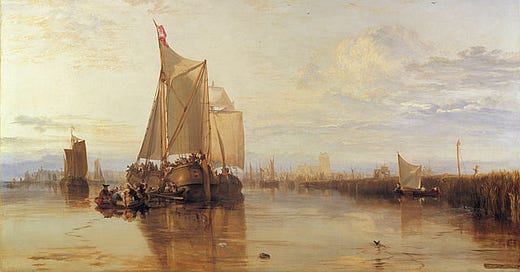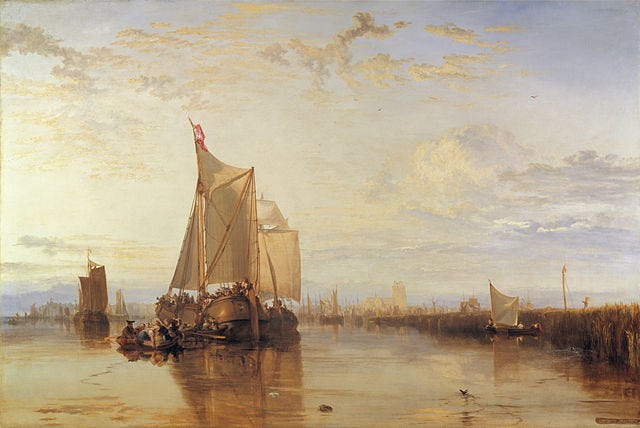Our back-to-school discount is still on for two more days at Word & Song, good for new paid and upgraded subscriptions as well as gifts (for the students, teachers, homeschoolers, and just about anyone who might like our magazine).
“Red skies at morning, sailors take warning,” went the old saying, and “Red skies at night, sailors delight.” The saying was pretty reliable, as it turns out. The red sky is a sign that there are particles of dust trapped in the atmosphere, as the “thicker” air scatters the blue side of the spectrum, where the wavelengths are longer, leaving the red side to dominate. The reason why we see the sky at sunset or sunrise altering color in a wash from blue to very pale green to yellow to orange and red as we approach the horizon is that the sunlight has to pierce a thicker shell of atmosphere the more the rays strike the air aslant. Now, if the skies are really red, it means that there’s a high pressure system at work, keeping the dust and other particles suspended. But since the earth is always spinning westward, the west gives you a clue as to what weather — our Word of the Week — you’re headed toward. A high pressure system means fair weather. But if the high is in the east, it means you’re leaving it behind, so you’d better watch out.
I’ve never met a person who wasn’t interested in the weather. For it can be terrible, as our countrymen in the western Carolinas, and northern Georgia and eastern Tennessee, and now Florida well know; Debra and I have weathered more than a few hurricanes in our time, and we have all who suffered through the recent terrible storms in our prayers.
Perhaps because it can be so powerful and unpredictable, the weather is fascinating nonetheless. When I was a small boy, we sometimes had to drive through a tunnel in eastern Pennsylvania in the winter, and since the tunnel was through a dividing ridge between one climate section and another, it would often be snowing on the north side and clear on the south side, or raining on the south side and clear on the north side. Debra’s Uncle Willard and Aunt Ruth had a farm in upstate New York, and in the winter they got those moisture-laden winds from off the Great Lakes, dumping huge loads of snow, sometimes enough in one blizzard to bury their house up to the second floor windows. Willard passed away one January, and we drove out there for the funeral, and found that it was about twenty degrees below zero (about -28 Celsius). But the people up there were used to it. They were riding snowmobiles that morning, though they had to keep their faces well muzzled up. You may know that when it’s that cold, the snow is dry, so you don’t get soaked to your skin if you are out in it.
That, of course, was winter weather, but I’ve always lived where you get plenty of summer too. Somehow the sweltering heat never bothered us when we were kids. We never said, “Oh, it’s too hot outside to play!” We played anyhow. Part of it was that nobody had air conditioning, so we were used to it. When it did rain, sometimes in my town you could smell it coming on: I suppose now that it was particles of sulfur from the colliery or from the coal mines themselves that got carried in the humid air. I don’t know. I do know that if by chance I were to take one breath of that same sort of air, fifty and sixty years later, I’d be all at once that kid again, transported through a kind of time machine of the weather.
The nicest place for weather that I’ve ever visited, I guess, was Bermuda, where it never gets really hot and it never gets cold at all, and there’s not much rainfall, either. Yet it was a storm off “the still-vexed Bermoothes” that wrecked an English ship in Shakespeare’s time, and it was the account of the miraculous survival of the men aboard, heard from only a year later, that inspired him to write The Tempest, which we’ve featured a couple of times here at Word and Song. The Latin word tempestas suggests, as Shakespeare well knew, and he integrated that knowledge into his play, that certain kinds of weather happen at certain times: think of the monsoon season in the Indian Ocean. As we live with day and night, with spring and harvest, so we live with fair weather and foul, although sometimes when it rains we do cheer, and it is as a blessing that Jesus says that the Father causes his rain to fall upon the just and the unjust.
The word weather comes from Old English weder, and is a cousin of German Wetter, as in the mild oath Donnerwetter! — which means, “Darn it!”, or, more literally, “Thunderation!” So why don’t we say “wedder”? It’s the same reason why we don’t say, “Hello Mudder, Hello Fadder,” except in that fine comic song about summer camp, or if you’re from Brooklyn. English words ending with the syllable -der underwent a sound shift in the 1400’s, when the pronunciation -ther began to take over. Not for brother, though; that always had the -th sound in it. It’s not good to be a fair weather friend, meaning somebody you can’t trust to stick by you when times get rough. But if you had a happy disposition, people used to say that it was always fair weather when you were around. Hence the name Meriwether: for a person always smiling, somebody to make you cheer! Ah, but there are a few hundred people in the world with the Italian surname Maltempo.
“Yes,” says the clerk at the hotel, “we do have a room for you, Mister — Mister — Lousyweather?”
“Just shut up and give me the key,” says the guest.
Word & Song by Anthony Esolen is an online magazine devoted to reclaiming the good, the beautiful, and the true. We publish six essays each week, on words, classic hymns, poems, films, and popular songs, as well a weekly podcast for paid subscribers, alternately Poetry Aloud or Anthony Esolen Speaks. Paid subscribers also receive audio-enhanced posts and on-demand access to our full archive, and may add their comments to our posts and discussions. To support this project, please join us as a free or paid subscriber. We value all of our subscribers, and we thank you for reading Word and Song!
Listen to this episode with a 7-day free trial
Subscribe to Word & Song by Anthony Esolen to listen to this post and get 7 days of free access to the full post archives.














